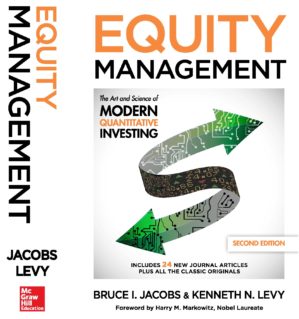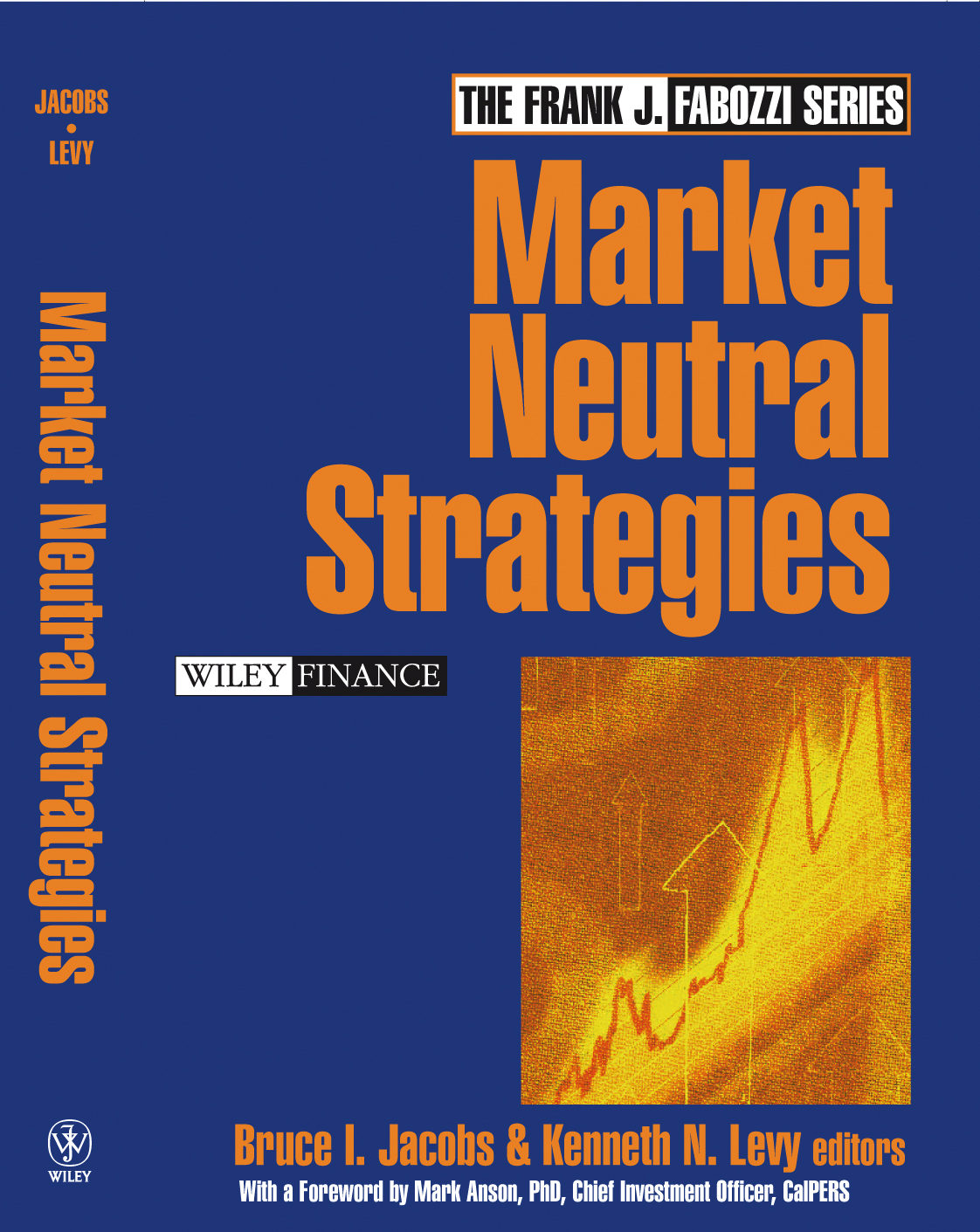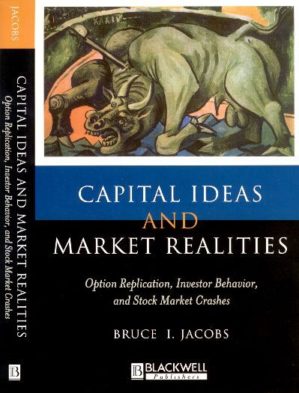
Jacobs Levy Equity Management is widely recognized as a leading provider of quantitative equity strategies for institutional clients. Building on the pioneering research of founders Bruce Jacobs and Ken Levy, the firm provides equity portfolios having the objective of either outperforming specified benchmarks or delivering absolute return, with managed risk. Jacobs Levy manages assets for institutions globally, including prestigious corporate defined benefit and defined contribution plans, public retirement and sovereign wealth funds, Taft-Hartley plans, endowments/foundations, and sub-advised funds, many of which are included in Pensions & Investments’ top 200 largest retirement funds. Read more.
 Bruce Jacobs
Bruce Jacobs
Bruce Jacobs, G’79, GRW’86, is chair of the Advisory Board of the Jacobs Levy Center. Jacobs is principal and co-founder of Jacobs Levy Equity Management, established in 1986. He is co-chief investment officer, portfolio manager, and co-director of research.
Jacobs’ articles on equity management have appeared in Financial Analysts Journal, the Journal of Portfolio Management, the Journal of Investing, the Journal of Investment Management, the Journal of Financial Perspectives, Japanese Security Analysts Journal, Operations Research, Annals of Operations Research, and the Journal of Impact and ESG Investing. He has received several Graham and Dodd Awards from Financial Analysts Journal, a Bernstein Fabozzi/Jacobs Levy Award from the Journal of Portfolio Management, and an Outstanding Article Award from the Journal of Investing. He serves on the Ambassador Advisory Board of the Journal of Portfolio Management, the Advisory Board of the Journal of Financial Data Science, and as an advisory editor for the Journal of Impact and ESG Investing. He has also served on the Financial Analysts Journal Advisory Council, and was an associate editor of the Journal of Trading.
Jacobs is author of Too Smart for Our Own Good: Ingenious Investment Strategies, Illusions of Safety, and Market Crashes, which was translated into Chinese by China Machine Press, and Capital Ideas and Market Realities: Option Replication, Investor Behavior, and Stock Market Crashes; co-author with Ken Levy of Equity Management: Quantitative Analysis for Stock Selection, which was translated into Chinese by China Machine Press, and Equity Management: The Art and Science of Modern Quantitative Investing, 2nd ed.; co-editor with Ken Levy of Market Neutral Strategies; and co-editor of The Bernstein Fabozzi/Jacobs Levy Awards: Five Years of Award-Winning Articles from The Journal of Portfolio Management, Volumes One through Five. He was a featured contributor to How I Became a Quant: Insights from 25 of Wall Street’s Elite.
Formerly he was senior managing director of a quantitative equity management affiliate of the Prudential Asset Management Company. Prior to that, he was on the finance faculty of the University of Pennsylvania’s Wharton School and consulted to the Rand Corporation.
Jacobs has a bachelor’s degree from Columbia College, a master’s degree in operations research and computer science from Columbia University’s School of Engineering and Applied Science, a master’s degree from Carnegie Mellon University’s Graduate School of Industrial Administration, and a master’s degree in applied economics and a doctorate in finance from the Wharton School.
In 2025, his gift to the Wharton School launched the Dr. Bruce I. Jacobs Master of Science in Quantitative Finance program. His philanthropy also established the Dr. Bruce I. Jacobs Professorship in Quantitative Finance and the Dr. Bruce I. Jacobs Scholars in Quantitative Finance, and played a critical role in creating an MBA major in quantitative finance at Wharton, which was introduced in 2020.
 Kenneth Levy
Kenneth Levy
Ken Levy, WG’76, G’82, is a member of the Advisory Board of the Jacobs Levy Center. Levy is principal and co-founder of Jacobs Levy Equity Management, established in 1986. He is co-chief investment officer, portfolio manager, and co-director of research.
His articles on equity management have appeared in Financial Analysts Journal, the Journal of Portfolio Management, the Journal of Investing, the Journal of Financial Perspectives, Japanese Security Analysts Journal, Operations Research, Annals of Operations Research, and the Journal of Impact and ESG Investing. He has received several Graham and Dodd Awards from Financial Analysts Journal and a Bernstein Fabozzi/Jacobs Levy Award from the Journal of Portfolio Management.
Levy is co-author with Bruce Jacobs of Equity Management: Quantitative Analysis for Stock Selection, which was translated into Chinese by China Machine Press, and Equity Management: The Art and Science of Modern Quantitative Investing, 2nd ed., co-editor with Bruce Jacobs of Market Neutral Strategies, and co-editor of The Bernstein Fabozzi/Jacobs Levy Awards: Five Years of Award-Winning Articles from The Journal of Portfolio Management, Volumes One through Five. He was a featured contributor to How I Became a Quant: Insights from 25 of Wall Street’s Elite.
Formerly he was managing director of a quantitative equity management affiliate of the Prudential Asset Management Company. Prior to that, he was responsible for quantitative research at Prudential Equity Management Associates.
Levy has a bachelor’s degree in economics from Cornell University, an MBA and a master’s degree in business economics from the Wharton School, and completed all requirements short of the dissertation for a doctorate at Wharton. He is a CFA charterholder and has served on the CFA Candidate Curriculum Committee, POSIT Advisory Board, and the investment committees of several non-profit organizations.
The Jacobs Levy Center
For Bruce I. Jacobs, G’79, GrW’86, PAR’10, and Kenneth N. Levy, WG’76, G’82, the arrival of the Jacobs Levy Equity Management Center for Quantitative Financial Research is well timed. “An increasingly complex world requires the tools that quantitative research can provide,” Jacobs told Wharton Magazine. “Finance will always be an ‘art,’ since it reflects human actions, not natural forces. But there is a lot to be gained by the application of scientific methods,” Jacobs added.
Bruce Jacobs and Ken Levy met at the Wharton School and went on to found Jacobs Levy Equity Management in 1986. For the first three years of the firm’s existence, they devoted themselves to research, in particular to researching the fundamental and behavioral factors underlying security returns and to what would become one of their many innovations: the “disentangling” of return-predictor relationships. In 1990, they began accepting assets from clients and applying their proprietary research in practice. As Ken Levy notes, “Our firm’s success is a testament to the usefulness of quantitative financial research.”
In commemoration of their firm’s 25th anniversary, Bruce and Ken are honored to endow the Jacobs Levy Center and Wharton-Jacobs Levy Prize to further research in quantitative finance for the benefit of all investors.
“Our firm’s success is a testament to the usefulness of quantitative financial research.”
Kenneth N. Levy, WG’76, G’82
Interviews
An Interview with Bruce I. Jacobs , Portfolio Management Research, New York City, Interviewed February 2020, Released May 2020
, Portfolio Management Research, New York City, Interviewed February 2020, Released May 2020
Bruce Jacobs discusses the key research concepts that serve as the foundation of Jacobs Levy Equity Management’s investment practice, including disentangling equity factors, smart beta vs. smart alpha, integrated long-short portfolios, introducing the idea of 130-30 portfolios, is 130-30 the right amount of leverage, and financial market simulation, as well as his book co-authored with Ken Levy on equity management and his books on crises, and the origins of the Bernstein Fabozzi/Jacobs Levy Awards.
Bruce I. Jacobs Interview at Davos 2020, “Jacobs Levy: The Art and Science of Investing,” TBD Media, Davos, January 2020
Bruce Jacobs explains an investment philosophy that combines the art of investing, which comes from intuition and experience, with the science of quantitative methods. He also describes 130-30 long-short and absolute return strategies, discusses the integration of environmental, social, and governance (ESG) principles into the investment process, and cautions investors about certain aspects of today’s markets.
Books
 Too Smart for Our Own Good: Ingenious Investment Strategies, Illusions of Safety, and Market Crashes, McGraw-Hill, 2018
Too Smart for Our Own Good: Ingenious Investment Strategies, Illusions of Safety, and Market Crashes, McGraw-Hill, 2018
Financial crises are often blamed on unforeseeable events, the unforgiving nature of capital markets, or just plain bad luck. Too Smart for Our Own Good argues that these crises are caused by certain alluring investment strategies that promise both high returns and safety of capital. Bruce Jacobs examines recent financial crises—including the 1987 stock market crash, the 1998 collapse of the hedge fund Long-Term Capital Management, the 2007–2008 credit crisis, and the European debt crisis—and reveals the common threads that explain these market disruptions. Investors aware of these commonalities may be able to avoid the mistakes of the past and even anticipate future crises.
 Equity Management: The Art and Science of Modern Quantitative Investing, Second Edition, Forewords by Harry M. Markowitz, McGraw-Hill, 2017
Equity Management: The Art and Science of Modern Quantitative Investing, Second Edition, Forewords by Harry M. Markowitz, McGraw-Hill, 2017
Bruce Jacobs and Ken Levy’s new edition of Equity Management contains the articles from the first edition on a multifactor approach to security analysis, a unified approach to portfolio management, and an integrated approach to market-neutral long-short, as well as 24 articles that appeared in peer-reviewed journals since the publication of that edition. These newer articles cover the growing popularity of factor investing, 130-30 long-short portfolios, optimizing portfolios with short positions, optimizing portfolios for leverage-averse investors, market fragility and financial crises, and simulating security markets. Introductions for each section of the book provide perspective, placing the articles within the context of developments in quantitative investing.
 Market Neutral Strategies, Foreword by Mark Anson, John Wiley, 2005
Market Neutral Strategies, Foreword by Mark Anson, John Wiley, 2005
Market neutral strategies have gained attention in recent years for their potential to deliver positive returns regardless of the underlying market’s direction. Market Neutral Strategies provides readers with industry insiders’ views of the risks and benefits of these strategies and how they can be implemented. The book covers long-short equity portfolios, convertible bond hedging, merger and mortgage arbitrage, and sovereign fixed-income arbitrage. Additional chapters cover the tax implications of market neutral investing for taxable and tax-exempt investors; the “transportation” of alpha from a particular market neutral strategy to other asset classes; and the failure of two infamous “market neutral” hedge funds, Askin Capital Management and Long-Term Capital Management.
 Capital Ideas and Market Realities: Option Replication, Investor Behavior, and Stock Market Crashes, Foreword by Harry M. Markowitz, Blackwell Publishers, 1999
Capital Ideas and Market Realities: Option Replication, Investor Behavior, and Stock Market Crashes, Foreword by Harry M. Markowitz, Blackwell Publishers, 1999
Some of the investment strategies that have arisen from modern capital ideas may have dire consequences for investors and markets. When these strategies are sold as free lunches without proper disclosure of their risks, they give rise to a faddish demand, which can lead to a debacle not only for their investors, but for the overall securities markets. Two examples are the advent of dynamic strategies designed to replicate options positions, known in the 1980s as portfolio insurance, and the highly leveraged arbitrage strategies of hedge fund Long-Term Capital Management.

The Bernstein Fabozzi/Jacobs Levy Awards: Five Years of Award-Winning Articles from The Journal of Portfolio Management (Volumes One, Two, Three, Four, and Five)
Bruce Jacobs and Ken Levy established the Bernstein Fabozzi/Jacobs Levy Awards in 1999 to honor the Journal of Portfolio Management editors Peter Bernstein and Frank Fabozzi, and to promote research excellence in the theory and practice of portfolio management. Selected by its readers, the annual Awards recognize the most innovative and compelling research published each year in the Journal. The Bernstein Fabozzi/Jacobs Levy Awards books feature an introduction from the editors and include each of the winning articles accompanied by commentaries from the award-winning authors discussing the motivation behind their articles and ongoing research. Every five years, the award-winning articles and commentaries are collected into a limited-edition book.
Selected Research Articles
Journal of Portfolio Management, Special Issue Dedicated to Harry Markowitz
“Portfolio Insurance, Portfolio Theory, Market Simulation, and Risks of Portfolio Leverage”
Multidimensional Investing
“Ten Investment Insights that Matter”
“Investing in a Multidimensional Market”
Disentangling Anomalies
“Building on Finance Theory to Forge the Future of Investment Practice”
“Factor Modeling: The Benefits of Disentangling Cross-Sectionally for Explaining Stock Returns”
“The Complexity of the Stock Market”
“Disentangling Equity Return Regularities: New Insights and Investment Opportunities”
Portfolio Engineering
“How Misunderstanding Factor Models Set Unreasonable Expectations for Smart Beta”
“Residual Risk: How Much is Too Much?”
“The Law of One Alpha”
ESG
“The Challenge of Disparities in ESG Ratings”
Market Neutral Long-Short Equity Strategies
“Long-Short Portfolio Management: An Integrated Approach”
“20 Myths about Long-Short”
Enhanced Active Equity (120-20 and 130-30) Strategies
“20 Myths About Enhanced Active 120-20 Strategies”
“Enhanced Active Equity Strategies: Relaxing the Long-Only Constraint in the Pursuit of Active Return”
Portfolio Optimization Including Short Positions
“Trimability and Fast Optimization of Long-Short Portfolios”
“On the Optimality of Long-Short Strategies”
Market Simulation
“Simulating Security Markets in Dynamic and Equilibrium Modes”
“Financial Market Simulation”
Market Crises
“Tumbling Tower of Babel: Subprime Securitization and the Credit Crisis”
“Risk Avoidance and Market Fragility”
Leverage Aversion and Portfolio Optimality
“The Unique Risks of Portfolio Leverage: Why Modern Portfolio Theory Fails and How to Fix It”
“Traditional Optimization Is Not Optimal for Leverage-Averse Investors”
Awards
Graham & Dodd Award: Presented by the Association for Investment Management and Research (today the CFA Institute) to “Disentangling Equity Return Regularities: New Insights and Investment Opportunities,” Financial Analysts Journal, May/June 1988.
View Article
Outstanding Article Award: Presented by The Journal of Investing to “Option Pricing Theory and its Unintended Consequences,” The Journal of Investing, Spring 1998.
View Article
Bernstein Fabozzi/Jacobs Levy Award: Presented by the Journal of Portfolio Management to “Long-Short Portfolio Management: An Integrated Approach,” Journal of Portfolio Management, Winter 1999.
View Article
Graham & Dodd Award: Presented by the CFA Institute to “20 Myths About Enhanced Active 120-20 Strategies,” Financial Analysts Journal, July/August 2007.
View Article
Graham & Dodd Readers’ Choice Award: Presented by the CFA Institute to “20 Myths About Enhanced Active 120-20 Strategies,” Financial Analysts Journal, July/August 2007.
View Article
Graham & Dodd Readers’ Choice Award: Presented by the CFA Institute to “Tumbling Tower of Babel: Subprime Securitization and the Credit Crisis,” Financial Analysts Journal, March/April 2009.
View Article
Recognition
Streetwise: The Best of The Journal of Portfolio Management: Compilation by editors Peter L. Bernstein and Frank J. Fabozzi (Princeton University Press, 1998) features “The Complexity of the Stock Market,” Journal of Portfolio Management, Fall 1989.
Journal of Portfolio Management Special 15th Anniversary Issue: Features “The Complexity of the Stock Market,” Fall 1989.
Journal of Portfolio Management Special 25th Anniversary Issue: Features “Alpha Transport with Derivatives,” May 1999.
Journal of Portfolio Management Special 30th Anniversary Issue: Features “Financial Market Simulation,” September 2004.
Journal of Portfolio Management Special 40th Anniversary Issue: Features “Ten Investment Insights that Matter,” September 2014.
Journal of Portfolio Management Special 50th Anniversary Issue: Features “Building on Finance Theory to Forge the Future of Investment Practice,” and was presented at the Journal of Portfolio Management 50th Anniversary Symposium, November 2024.
Co-Edited Issues of Journal of Portfolio Management
Introduction: “The Birth of Portfolio Theory,” by Frank J. Fabozzi, Bruce I. Jacobs, and Kenneth N. Levy, Eds., Journal of Portfolio Management, Special Issue Dedicated to Harry Markowitz, July 2024.
Introduction: “The Legacy of Stephen A. Ross,” by Frank J. Fabozzi, Bruce I. Jacobs, and Kenneth N. Levy, Eds., Journal of Portfolio Management, Special Issue Dedicated to Stephen A. Ross, June 2018.



